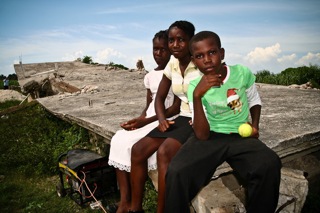Haiti Mission Trip 2010
I don’t usually like explaining my videos, especially one like this, which is the best attempt I can give at visually trying to communicate the complex mix of emotions that I got when visiting my country. It is extremely difficult to know what to say and how to say it when I talk about Haiti. This video is addressed specifically to people who go to Haiti trying to help out.
In August of 2010, I returned to Haiti with a medical team from Costa Rica. I was the only English speaker on the team; I was the only one with considerable background knowledge of where we were going. It was exhilarating and discouraging, seeing the country with a fresh set of eyes. I would hear again, through conversations with my teammates, the same myths and oversimplifications that plague anyone who shapes their understanding of Haiti from the crisis-reports that break out in popular media from time to time. I would also see the raw compassion and dedication that the resulting sense of urgency from these reports evoked from them.
The video expresses exactly how I’ve come to view missionary work today. First of all, there is the necessary listing of statistics and deliverables, the “impact statement” we cite to feel successful about our time there. The people we visit, though, are less concerned about these numbers and more concerned with whether we got to see them personally, and with how we treated them. We’ve made sacrifices to get there. Now we’d better be willings to walk that final mile, take those extra few minutes, and push ourselves to the very brink of our ability with some meaningful, useful service. 1600 km doesn’t mean anything if you don’t walk the final one to visit someone’s home. Bringing suitcases of medicines doesn’t mean anything… if you don’t get it to that final child who needs it.
The comment on dressing up for the party is something characteristic of the people who came for consultations – they were dressed in their best clothes, freshly cleaned and perfumed, and polite and cooperative despite rather limited measures we could take to offer them comfort and order.
Another thing the video touches on is my conviction that when we visit places, like Haiti, our first and most important act is to listen. Especially in issues of spirituality… I feel like anyone who has suffered great loss should not be lectured or preached at, but listened to. And not just superficially, as a sort of therapeutic technique, but genuinely and whole-heartedly, because the words they speak about God in those tender moments after tragedy are the ones we need to hear. It is their perseverance and hope and faith that we should tap into, and not the other way around.
I’m sure people are grateful for any help we are able to offer. But conversely, we go back with so much more. We return to our country immeasurably indebted to those we thought we were going to give to. I hope they realize that. I hope we realize that, and start repaying that “debt” in whatever way we can once we get back home.
Images from August 2010 mission trip with a team of Costa Rican doctors to Haiti.

